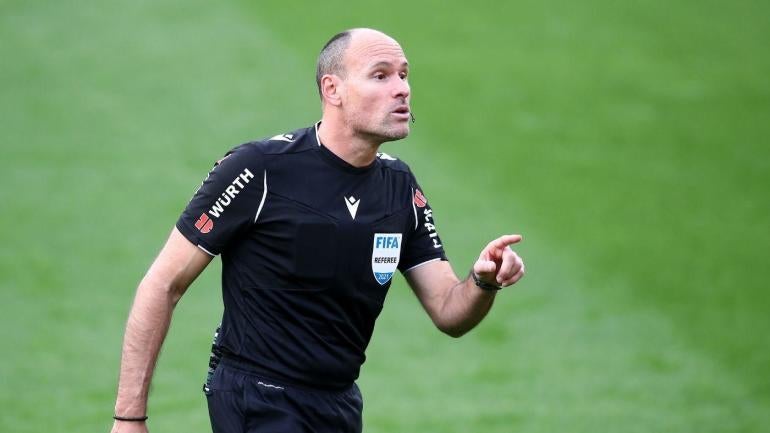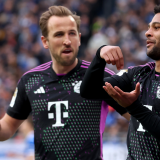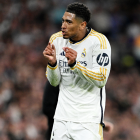
The semifinals in the UEFA Champions League just ended. The phone rings. You answer. It's Roberto Rossetti, UEFA Chief Referee Officer and Chairman of UEFA Referee Committee, and he starts with, "On behalf of the UEFA Referee Committee, congratulations! You have been appointed to the UCL Championship fixture…."
Once the impact of the news subsides, it hits you. It's go time. For all the days, nights, weekends, sweat, tears, injuries, sacrifices, highs and lows, it's time to focus all your physical and educational training into the upcoming final. It seems so far away and yet so close at the same time. No time left to lose. The concentration starts now.
Who is the Champions League final referee?
On Saturday when the Champions league final begins (live on CBS and Paramount+), those referees will be led by 44-year-old Spanish referee Antonio Mateu Lahoz. Lahoz has officiated in the Champions League for nine years and his highest appointment to date was the 2017 semifinal between Monaco and Juventus and the 2020 semifinal between Lyon and Bayern Munich. He has made 34 appearances as lead official in Champions League fixtures and has officiated Chelsea two times and Manchester City four times in Champions League play. It has been over a decade since a Spanish official took charge of the Final with the last Spaniard being referee Manuel Mejuto Gonzalez in the 2005 Final between Milan and Liverpool.
Referee Lahoz is joined pitch side by fellow Spaniards Pay Cebrian Devis, Roberto Diaz Perez del Palmora and Carlos del Cerro Grande. He will be supported by his eyes in the sky VAR team led by Alejandro Jose Hernandez Hernandez, Juan Maerinez Munuera, Inigo Prieto Lopez de Cerain and Pawel Gil. A husband and father of two, Lahoz reflected on this appointment saying he, "never really imagined that, one day, [I] would referee a Champions League final" and credits his referee team for the reason they have arrived at this historic moment in their careers.
What is refereeing a Champions League final like?
Famed referee Howard Webb took charge of the 2010 UEFA Champions League final and reflected on his experience and the significance of the appointment for the officials:
You know it's a hugely significant game not only for the players, but also for you and your refereeing crew. It's one of those stand out moments in a long career that will define you. And people tell you to treat it just like another game! I found that impossible. However, you draw strength from the knowledge that you've performed to a really high level repeatedly in other big games which has resulted in your selection for this game. You draw strength from the quality of the colleagues you will be working with in your team. You draw strength from the trust that others have placed in you. And you know that games which are played under so much scrutiny are a wonderful opportunity to shine, and to do a great job. You know the natural adrenaline will flow and that will sharpen your senses and increase your cognitive skills, meaning you're more likely to make correct calls in the moment. So you do your homework on the teams and the matchups and then trust your ability to deliver a refereeing performance worthy of the stage, which will have a positive impact on the game. And at the end, when nobody is talking about you, it's the most satisfying feeling in the world, and when the final whistle went off in the Final, it was the most emotional moment of my career.
How do referees train for the Champions League final?
The congratulatory calls from the referee to the rest of the crew are immediately followed by a game plan by the team regarding the final days leading to the game and how they will prepare physically, mentally and educationally, both individually and collectively. Just like the players, the referees will schedule their training protocols to enable them to hit peak performance on game day. They will taper their training load and focus on maintaining their elite fitness with focus on explosive sprints, agility and quick reaction. The heavy weight training subsides and the explosive body weight resistance and movements becomes key. The nutrition component becomes even more intentional, being sure to provide the proper resources to fuel oneself while not trying anything new or outside of normal practice.
Rest, recovery and the ability to mentally step away to what makes you happy is critical. While in focused, concentration mode, it is still important to laugh and feel and take the moment to be in the moment - "smell the grass" - and have that balance.
Do referees scout the teams in advance?
Absolutely. In the days before the match, TV, social media, journalists all go silent. It's a must. The team will begin to train mentally in as much of a mental isolation as possible leaving projections and conjectures and opinions outside of their focused training. Film of both final teams' recent games will be analyzed by the entire referee crew, tactics discussed, personnel traits examined, rosters and impact players broken down, and hypotheticals discussed to ensure the team can react consistently and efficiently to as many possible scenarios as possible. Colleagues who recently officiated either of the teams will be part of the game preparation for the referees. The officials working the game will seek input regarding how team tactics and strategy impacted referee movement and anticipation to give the referees of the final the best possible chance and edge to be in the right place for the game critical calls.
Film of the referees own officiating performances of the season will be reviewed by the officials and discussed among the team regarding their own self and group analysis. The critical goal here is to discuss any situation (even the unexpected) that could arise. How will the referee team individually and collectively react or be proactive in order to eliminate any form of doubt or uncertainty on the day of the match. The referees will discuss with their mentors and colleagues any tendencies they have observed in their officiating that could assist or impact the game both positively and negatively to create awareness in advance. In our industry, we say "expect the unexpected". I personally say, it never matters until it matters so address all the details to be ready for when it matters.
When do the referees travel to the match site?
Travel to the final begins 2-3 days before the match to allow for the officials to become acclimated to the weather and elevations and have the opportunity to train near the stadium. The referees reside as far away as possible from the teams and festivities to allow full preparation. Referees will inspect the stadium the day before the match and have an opportunity to be on the pitch, review the VAR technology and calibration, and meet and prepare with the video operators and personnel who will be in the VAR room for the match to ensure the VAR's team is on the same page regarding how they work together and how they will communicate to the on-field officials. Pregame meetings with match commissioners and team representatives will occur to go over logistics regarding the equipment and kits, game day ceremonies, acknowledgements of any dignitaries, review of relevant UEFA regulations, and for the referees to answer any relevant questions from the teams at this meeting.
On the day of the final, leading up to departure from the hotel - the referee team will have one last final meeting in a calm environment to go over final details and begin their personal game day rituals. Arrival at the stadium will be a minimum of two hours before kick-off time, and off to work they go, inspecting the field, ensuring the technology is working, and addressing all pre-game procedures and requirements. With one final chant and prayers in the locker rooms, the referee team takes its cue and proceeds to the tunnel minutes before the team and prepares to take on the most impactful moment for the referees - leading the teams onto the pitch to kick off the beautiful game to the roar of the crowds.
Officiating the best football and players in the world demands a performance driven mindset to break into officiating Champions League. Importantly, it demands a high level of consistency in performances to remain. An appointment to the final does not happen overnight or even after one or two good seasons, it takes actual game experience in the Champions League as there is no other kind of league like it in the world. The referees who have taken charge of the Final have been of the average age of forty-one years old with six years officiating in UCL before the prestigious appointment. It is a portfolio of performances that can only be created over time.





















